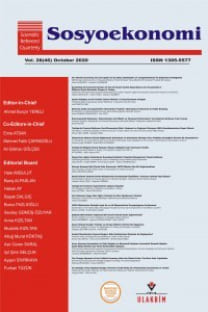Work–Family Conflicts of Practitioners of Accountancy: Practice of Diyarbakir
-
Work-Family Conflicts of Practitioners of Accountancy: Practice of Diyarbakir
-,
___
- Apaydın, Muazzez Deniz (2004), “Çift Kariyerli Ailelerde İş-Aile ve Aile-İş Çatışmalarının Kendini Kurgulama Düzeyleri İle İlişkisi”, Hacettepe Üniversitesi, Sosyal Bilimler Enstitüsü, Yayımlanmamış Yüksek Lisans Tezi, Ankara.
- Ayboğa, Hanifi (2003), “ Globalleşme Sürecinde Ülkemizde Muhasebe Mesleği ve Meslek Mensuplarının Eğitimi”, Marmara Üniversitesi İİBF Dergisi, Cilt 18, Sayı 1, 327-359.
- Banar, Kerim & Vedat Ekergil (2010), “ Muhasebe Meslek Mensuplarının Hizmet Kalitesi: Sunulan Hizmetlerin Kalitesi İle Müşteri Memnuniyeti İlişkisi Eskişehir Uygulaması”, Anadolu Üniversitesi Sosyal Bilimler Dergisi, Cilt 10, Sayı 1, 39-60.
- Ballıca, Sabahat (2010), “İş Görenlerin İş Yaşam Dengesi Algılamaları İle Cinsiyet Rolleri ve Bireysel Özelliklerinin İlişkisi: Büyük Ölçekli Bir İşletmede İnceleme”, Çukurova Üniversitesi Sosyal Bilimler Enstitüsü, Yayımlanmamış Yüksek Lisans Tezi, Adana.
- Çarıkçı, Hüseyin İlker & Özlem Çelikkol (2009), “İş-Aile Çatışmasının Örgütsel Bağlılık ve İşten Ayrılma Niyetine Etkisi”, Süleyman Demirel Üniversitesi Sosyal Bilimler Enstitüsü Dergisi, Sayı 9, 1429-1441.
- Çarıkçı, İlker Hüseyin & Aygen Oksay & Münire Çiftçi & Seher Derya (2009), “Türk Çalışanlarında İş Aile Yaşam Çatışması”, International Davraz Congress (On Social and Economic Issues Shaping the World's Future - New Global Dialogue), 24-27 September 2009, Isparta - Turkey, 1429-1441.
- Doğan, Hulusi & Engin Üngüren & derya Kesgin Dönmez (2010), “Meslek ve Aile Yaşamı İlişkisi Profesyonel Turist Rehberlerine Yönelik Bir Araştırma”, Journal of Yaşar University, 2010, 20(5), 3430-3442.
- Doğrul, Burcu Şefika & Seda Tekeli (2010), “İş-Yaşam Dengesinin Sağlanmasında Esnek Çalışma”, Sosyal ve Beşeri Bilimler Dergisi, Cilt 2, Sayı 2, 11-18.
- Efeoğlu, İbrahim Efe (2006), “İş-Aile Yaşam Çatışmasının İş Stresi, İş Doyumu ve Örgütsel Bağlılık Üzerindeki Etkileri: İlaç Sektöründe Bir Araştırma”, Çukurova Üniversitesi, Sosyal Bilimler Enstitüsü, Yayımlanmamış Doktora Tezi, Adana.
- Frone, Michael R. & M. Russell & M.L. Cooper (1992), “Prevalence of Work Family Conflict: Are Work And Family Boundaries Permeable”, Journal of Organizational Behavior, 13, 723-729.
- Kaya, Esma Ülkü (2008), “ İş-Ev Etkileşiminin İş Koşulları İle İlişkisi: Postacılık Hizmetinde Bir Çalışma”, Fırat Üniversitesi Sosyal Bilimler Dergisi, Cilt: 18, Sayı: 2, 253-275.
- Lockwood, Nancy R. (2003), “Work / Life Balance: Challenges And Solutions”, 2003 Research Quarterly, HR, Society For Human Resource Mangement.
- Netemeyer, Richard G. & James S. Boles & Robert McMurrian (1996), “Development and Validation of Work-Family Conflict and Family-Work Conflict Scales”, Journal of Applied Psychology, Vol 81, No. 4, 400-410.
- Önderoğlu, Seçil (2010), “Örgütsel Adalet Algısı, İş-Aile Çatışması ve Algılanan Örgütsel Destek Arasındaki Bağlantılar”, Ankara Üniversitesi, Sosyal Bilimler Enstitüsü, Yayımlanmamış Yüksek Lisans Tezi, Ankara.
- Özdevecioğlu, Mahmut & Aylin Aktaş (2007), “Kariyer Bağlılığı, Mesleki Bağlılık ve Örgütsel Bağlılığın Yaşam Tatmini Üzerindeki Etkisi: İş-Aile Çatışmasının Rolü”, Erciyes Üniversitesi İktisadi ve İdari Bilimler Fakültesi Dergisi, Sayı: 28, Ocak-Haziran, 1-20.
- Özen, Serap & Turgay Uzun (2005), “İşyerinde Çalışanın Yaşadığı Çatışmanın Azaltılmasında Örgütün ve Ailenin Rolü: Polis Memurlarına Yönelik Bir Uygulama”, Dokuz Eylül Üniversitesi Sosyal Bilimler Dergisi, 7 (3), 128-147.
- Pichler, Florian (2008), “Determinants of Work-Life Balance: Shortcoming in the Contemporary Measurement of WLB in Large Scale Surveys”, Humanities, Social Sciences and Law.
- Sekaran, Uma (2003), “Research Method For Business”, 4E WSE: Skill Building Aproach, p. 253.
- Yereli, Ahmet Burçin (2006), “Muhasebe Meslek Mensupları Anketi: Mesleki Profil, Sorunlar, Çözüm Önerileri”,
, ss. 1-43. - Yüksel, İhsan (2005), “ İş-Aile Çatışmasının Kariyer Tatmini ve İş Davranışları İle İlişkisi”, İktisadi ve İdari Bilimler Dergisi, Cilt 19, Sayı 2, 302-314.
- Zincirkıran, Mustafa & Hidayet Tiftik (2013), “Burnout Research for Members of Practitioners of Accountancy: Practice in the City of Diyarbakır”, İşletme Araştırmaları Dergisi, 5/4.
- Zincirkıran, Mustafa (2013), “İşkoliklik İle İş-Aile Çatışması İlişkisinin Yapısal Eşitlik Modeli İle İncelenmesi: Sağlık İşletmelerinde Bir Uygulama”, Dicle Üniversitesi, Sosyal Bilimler Enstitüsü, Yayımlanmamış Doktora Tezi, Diyarbakır.
- ISSN: 1305-5577
- Yayın Aralığı: 4
- Başlangıç: 2005
- Yayıncı: Sosyoekonomi Derneği
Ahmet ŞAHİNÖZ, Zahra FOTOUREHCHI
Kamu Alacaklarının Korunma Yöntemleri ve Bir Değerlendirme
Work–Family Conflicts of Practitioners of Accountancy: Practice of Diyarbakir
Mustafa ZİNCİRKIRAN, Hidayet TİFTİK
Patent Harcamaları ve İktisadi Büyüme Arasındaki İlişki: Türkiye Örneği
Ahmet ŞAHİNÖZ, Zahra FOTOUREHCHI
The Uncounted Who Wish to Work – Distinct to the Unemployed or Similar?
Türkiye'de Vergi Denetim Sistemi ve Sistemin Aksaklıklarının Değerlendirilmesi
Eğitim, Sağlık ve Teknoloji Düzeyinin Ekonomik Büyüme Üzerindeki Etkisi: ARDL Sınır Test Yaklaşımı
Türkiye'de Cari Açığın Belirleyicilerinin Ampirik Analizi
Aydanur GACANER ATIŞ, Fatih SAYGILI
Finansal Kalkınma ve Gelir Eşitsizliği: Türkiye Örneği, 1980-2012
